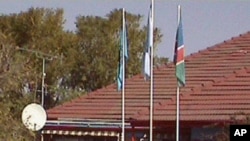The Executive Director of Namibia’s National Society for Human Rights (NSHR) said his organization will pressure the Southern African Development Community (SADC) to address what he says are the killings and inhumane treatment of human rights defenders.
Phil ya Nangoloh told VOA SADC leaders should come up with a pragmatic plan to resolve the deteriorating human rights conditions in the sub-region.
“We are concerned with the assassinations or murders of human rights defenders in the DRC (Democratic Republic of Congo). We are also going to talk about human rights defenders in Angola with regards to Cabinda in particular. We are equally concerned about the issue of (President Omar Hassan) al-Bashir because (Namibian) President Lukas Pohamba has agreed not to execute the (Darfur war crimes) arrest warrant of Mr. Bashir,” he said.
Several ministers in the southern African region are participating in the Council of Ministers meeting in Namibia’s capital, Windhoek.
The meeting, which began Monday, is scheduled to end on 17th August. High on the agenda is food security, as well as the implications of the recent global economic crisis on the sub-region.
According to the regional bloc, other issues to be discussed include institutional arrangements for the SADC Economic Partnership Agreement (EPA), a report on the EPA processes, and progress made in the Eastern and Southern Africa and East African Community EPA.
But, executive director ya Nangoloh said that rights groups in the region are displeased with the “lackadaisical attitude” of officials in the region towards human right issues.
“We are going into the streets to demonstrate to make our voices heard. We are going to place newspaper advertisement(s) about the same issues. We are going to use all possible legal means to make our voices heard. It’s not going to be business as usual. As a matter of fact, it’s going to be business as unusual,” ya Nangoloh said.
He also said there are human rights concerns in Zimbabwe, the Kingdom of Swaziland and South Africa.
Ya Nangoloh said new media laws currently under consideration in South Africa could undermine efforts of human rights defenders in that country. Critics of the new proposals have reportedly likened them to media laws in effect during the apartheid years.




